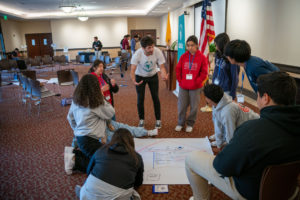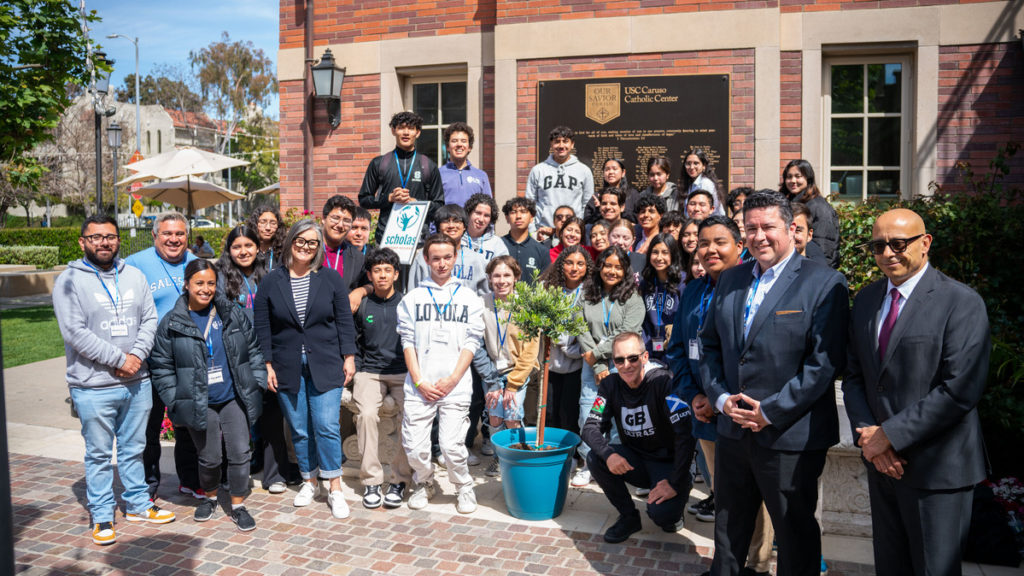Seventeen-year-old Denise Salas choked back the emotion as she talked about her suicide attempt and the hospitalization that followed.
“I felt dehumanized and I felt like a sick dog in a cage,” said Salas before an audience of students and lawmakers at the Los Angeles launch of the Scholas Citizenship Program, a youth engagement initiative created by Pope Francis. “I was ignored and I had to take the initiative to communicate with the nurses about what my situation was.”
Salas, a senior at Bishop Conaty-Our Lady of Loretto High School in the Pico-Union neighborhood of LA, said she’s doing better now and wants to advocate for quality mental health care.
She’s not alone.
Mental health topped the list of concerns for the 45 teens participating in a special pilot event for the program held May 5-6 at the USC Caruso Catholic Center. All from local Catholic high schools, the students spent the time together sharing experiences, discussing solutions, and presenting their ideas to government officials.
“For me, it’s really personal. I have my days, days that I don’t feel as good as others. I isolate myself. I try not to talk to anybody,” explained Damien Pereida, a junior at Bishop Mora Salesian High School. “I want to be a helping hand to people who feel like me. I don’t want to just say it, I want to do it.”
The USC event was organized by “Scholas Occurrentes,” a global education project launched in Argentina by then-Cardinal Jorge Bergoglio in 2001 when he was archbishop of Buenos Aires. Its stated aim is to “encourage social integration and a culture of encounter among high school students through sports, arts, and technology.” With the support of Archbishop José H. Gomez, Los Angeles became home to its first U.S. chapter in 2019.
The other Catholic schools represented were Bishop Mora Salesian High School in Boyle Heights, Loyola High School in Pico-Union, and Sacred Heart High School in Lincoln Heights.
The outcomes of the students’ small-group discussion sessions were eventually presented in the form of posters to a panel of local leaders, including LA City Councilwoman Monica Rodriguez and Rigoberto Reyes, Executive Director of the Los Angeles County Office of Immigrant Affairs.
One student group hoped to counteract negative social media by launching an uplifting Instagram account called “layouthproject.” The teens said they’ll post inspiring messages and stories related to mental health. The second group envisioned a “Student Support Center” at every school where youth can talk to a peer or professional counselor. The last group pitched a “night school” for parents so they can better understand what their children are going through, the teens noting people from older generations or different cultures may have little experience with mental health issues.

Panel members offered both praise and advice to the students. Reyes said the parent education plan could play a vital role in some of LA’s immigrant communities.
“In certain cultures, we don’t want to show that we have concerns about our mental health. Language access is another big challenge for our county services,” Reyes said.
Student presenter Emily Harb admitted she wasn’t initially sure about giving up her Saturday for the event. But knowing her voice was heard made it worth it.
“People always say ‘You’re the future of our society.’ Yeah, but you guys don’t want to listen to us,” said Harb, a freshman at Sacred Heart. “We want to help. We want to lift this issue up and raise awareness. Today we got to do that.”
Scholas officials say empowerment is part of the plan. They want young people to become engaged citizens after the long isolation of the COVID-19 pandemic and the daily isolation that comes with modern technology.
“Young people have been brought up in an environment where they’re completely attached to their phones,” said Joe Alarcon, LA coordinator for Scholas. “With this, we bring them out of their shells, let them engage with other people in their community, and create that culture of encounter that the Holy Father speaks about.”
For some students, the “Francis factor” was key to the event.
“I love how Pope Francis is making a contribution to our generation. I was so thankful to be invited to this event.” said Destiny Quiroz, a sophomore at Bishop Conaty. “We’re going to do our best in solving this issue.”
For that, they’ll need money. Scholas officials say they’ll assist in finding grants and donations. They also announced that a student representative from each school will attend the organization’s upcoming 10th anniversary party in Miami. Pope Francis is expected to participate via livestream.
As the two-day pilot program came to a close, the students planted an olive tree as a living symbol of their experience and what they achieved.
“You shouldn’t feel bad about crying, expressing your emotions,” said Clemente Ortiz, a junior at Loyola. “It’s really essential to talk and let it all out. I think what we did today was so important.”

